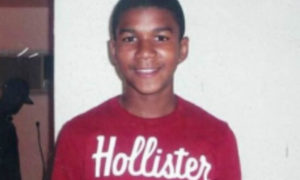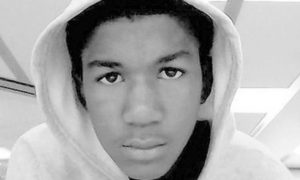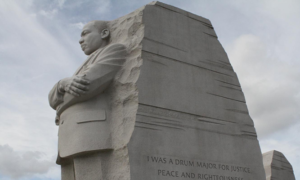George Zimmerman Trial,spirituality
Standing on a Prayer: A Burden for People of Color (Part 2)

It took almost a week but then it happened. The President – the African American, Black President – spoke as person of color and not just as POTUS (President of the United States). For many people of color, he’s not “just POTUS”. He is POTUS + BLACK. He is someone who can finally put texture to systemic injustice perpetrated by the pervasive presence of white privilege. He, some of us think, can accomplish this by simply using the currency of what we people of color have always experienced as the white man’s Presidency. It’s not an uncommon idea. Presidents of the dominant culture have either knowingly or obliviously perpetrated white privilege since our country’s beginning.
People of color have for five years held hope that we will get our chance. And we’ve been waiting for “our” President to say something. We genuinely and intellectually understand he’s not only our president but there is a sentiment that reverberates deep in our souls believing that we finally have a President who really understands us. We hoped we had someone that didn’t have to be convinced by our story because he understood our language. People of color have not succeeded at using the white man’s language to convince him of his bigotry. It’s been insufficient to lift him to conscience. For some reason, they’re unwilling to translate and reach for an empathetic context. The fact that people of color have used the jargon of white privilege to tell its story is itself a testament that we’ve been willing to answer their prayers.
Beyond saying he could have been Trayvon Martin 35 years ago, President Obama also asked this…
“if Trayvon Martin was of age and armed, could he have stood his ground on that sidewalk? And do we actually think that he would have been justified in shooting Mr. Zimmerman who had followed him in a car because he felt threatened. And if the answer to that question is ambiguous then we might want to examine those kinds of laws.” ~President Barak Obama
I had been waiting to write and respond to the nation’s unrest in reaction to the Zimmerman verdict. It’s easy to be caught up in the sensationalism of a big news event. We get that adrenaline rush that comes when our emotions are excited. And often, not always, our first reactions are intense but misguided. I wanted to think about it and watch the nation react to see what might happen after things leveled off.
In my previous article, Prayers We Pray, I raise the question of our mindfulness to others. Not that we can know what’s in our neighbor’s mind, but we can reasonably accept none of us want harm to come to us. The President’s question is a prayer of inquiry, one where he asks us to consider our response. “If the answer”, he said “to that question is ambiguous…” We are asked to rethink our laws about standing our ground. Can we accept that there exists a lack of clarity in really knowing when our fears are real – when they are really justified?
In the movie, After Earth, the assertion is made, “Danger is real, but fear is a choice.” It’s counter- cultural and counter-normal to assert that often our fears aren’t justified especially in a world that trades almost exclusively on fear. Our profits are driven by feeding our compulsion for security. We are sold a notion that a threat to life is eminent and if someone is smart enough, they can capitalize on it. Is this even sane? It is virtually impossible to build a safe society as long as the fear of the threat of danger is more real than the threat and/OR danger itself. In this world, everyone is my potential enemy and I am justified to build a wall of protection against them – this means against you too. In this world, empathy is non-sustainable and vulnerability is the choice of the foolish. Yet living this way is counterintuitive to building communities of trust. The lack of trust will always justify my right to defend against you even when my disposition is fueled by paranoia.
People all over the nation set plans for meetings, stand-ins and vigils in an effort to bring attention and awareness to social unrest fueled by the verdict. I was a part of one such meeting held the Sunday immediately following. Nine of us met at the home of a local social justice facilitator. Our group was made up of five African Americans, one Peruvian and three Whites. Another snapshot shows us as five women and four men. Still, no white men showed up. This isn’t to say there weren’t white men somewhere committed to rethinking justice. It didn’t happen to be where we were. What we wanted was to do something that would live beyond the sensationalism of the event. We wanted something lasting and penetrating. We entered that meeting wondering if we could build a better society. We left that meeting determined to do so.
We seemed to come to a consensus that we experience a growing unrest with the level of social injustice occurring in our own community. The Monday following the verdict, a black youth was shot by local police for fleeing arrest. Is this the only way? Can we not be afraid of each other? The Zimmerman verdict was a trigger that caused us all to yearn for action – not merely rallies or protests but true social change.
A new counter culture can emerge, a culture not based on fear which is the culture we currently live in. It will take, we thought, building a model community that emulates this new currency – a currency that doesn’t trade on fear. We have the potential to create a movement. Not necessarily the kind that ends up in history books, but the kind that shifts perspectives. We agreed that our next step would be a shared investment – not a financial one but a personal one.
“…A better world is possible. A more loving world is possible. And we need vulnerability and empathy and a lot of time spent listening to begin moving in that direction. Scoff at me if you want, but I believe in the power of people to do better and I know it has to start with each of us, making up our own mind to push past fear toward love. And it won’t be easy…” ~Meredith Martin-Moats
Meredith, an Arkansas citizen from Dardanelle, in her succinct statement, inspires my thinking about how we can accomplish this –together.
We are still looking for trusted answers and better pathways to vulnerability and empathy. A city collective is praying for answers. Vulnerability and empathy are virtues which are categorized and sometimes caricatured as formulations of “weakness”, a subset of fear. I don’t believe for a minute that empathy or vulnerability is a sign of weakness. On the contrary, these are virtues of the strong and wealthy. However the dominant culture seems to view these as weakness. As such, we tend to realize them almost exclusively as attributes of fear. We can trade on fear. It’s a viable commodity but this need not be.
One report in the associated press states that Zimmerman’s life is in danger just by being acquitted. This suggests that someone somewhere wants him to die. It feels like a fair solution to what many think is murderer gone free. But who is threatening him and why? The AP goes on to say that it would cost an estimated $3000 daily to keep him protected for the next year. This does not include the cost of a new identity coupled with a new residence in an unknown city. Does this not seem insane? This amounts to roughly $1,000,000 annually – that’s ONE MILLION DOLLARS! Really? Can we not just see our way to not make his security worth that much? We can live a smarter existence than that.
We can change the way we see this but only if we create a habit of looking at life through a lens of compassion. We can use a type of engaged compassion that moves us beyond tolerance toward a genuine desire to understand those who live with cultural differences. We can live toward an effort to build a context for sustaining such a difference in a way that brings beauty and texture to all of us. We can have difference without disagreement but not without an openness to see those we call different as having the capacity to augment our lives. Our ability to live, love and extend this way is limitless. We will be challenged to not believe this but we don’t have to buy into the fear of doing the opposite – protecting ourselves from those who see the world through a different colored lens. And we sure don’t have to create a context for fear that annually grosses at a million large for the likes of a George Zimmerman. That just ought not be.
The purchase of security is valid only after we buy into fear. We are challenged to not believe this too, almost daily. It’s likely we are challenged several times throughout the day. This simply means that we are visited with moments which can be interpreted as extremely uncomfortable. In these moments, we are tempted or invited to seek comfort and often at the expense of those affected by our decisions – and we are making these decisions unceasingly. When these temptations or “invitations” arise, we are also visited with an opportunity to examine whether our choices bring wholeness and sustainability to the community or whether they nurture our inclination to survive. If we’re trying to simply survive, we won’t hear anyone’s prayers but our own. This too, is part of our problem.
Zimmerman, I have no doubt, was convinced of his poverty as well as his right to survive. Anyone of us who feels this way is likely to attempt survival at the expense of someone if not everyone. Survival and sustainability feel similar but they aren’t the same. Survival is replete with the notion that there is an imminent threat. Sustainability is replete with the notion that there is enough resource to bring life to all who are affected. Survival reaches for security- even a false sense of it while sustainability lives in the abiding awareness of safety. Those who are safe don’t fear for their lives. Those who are secure still wrestle with the threat of loss.
Those who choose from the posture of fear will almost always choose survival; those who choose from the posture of love will almost always choose sustainability. I have no empirical data about everyone but in my experience, those who choose love do so because they see the power of their lives optimized in the unavoidable symbiosis of life exchanges. The survivalist will take a life and most definitely weaken one. We cannot sustain what we also threaten. This is how we truthfully distinguish those who are poor and those who are wealthy.
Who are the poor? They are those who for whatever reason believe there is not enough and use that belief as a moral high ground to build a context for oppression. How do we miss this and why are we misguided about it? We are misguided because we (the dominant culture) believe that those who have more have done so almost exclusively by hard work, good work ethic and in many cases, bowing to white privilege. Hard work is not the key and does not guarantee success. Criminals work hard and many of them have good work ethic. This is not to be confused with having ethical character. They are not synonymous. A criminal’s success is identified exclusively by their victim’s demise. The likes of Hitler and more recently Osama Bin Laden were quite successful for a time and not without resource and hard work. The prison industrial complex is not without resource and most assuredly hard work. Some could argue smart work because they live successfully through the currency of those who perpetrate criminal behavior. Our city governments are not without resource or hard work, Detroit, MI notwithstanding.
These institutions are misguided often because they perpetuate the idea that strength lives almost exclusively by creating a context for weakness and visibly exploiting it. Slaves worked very hard and so do children who are victims of trafficking through pornography and prostitution, other forms of slave labor. It takes more than hard work and determination to build a fair and equitable society. It takes the resolve to face our personal and social demons. It will take us no longer yielding to an impulse to sweep such utter selfishness under the carpet. We will finally have to say “Goodbye” to a currency that trades on fear.
How long will we sell and celebrate oppression by subversively suggesting that it is Success? It will happen as long as the “aspiration toward wealth” can exist as code for the “ambition toward oppression. “
Who then are the wealthy? They are those who see themselves as a resource to bring strength to those who temporarily have less strength. Even if it’s a seventeen year-old boy bringing skittles to an even younger boy. Why temporary? Because they see no value in continuing to perpetuate weakness as a springboard to selfish gain and who are no longer willing to support ideologies that deplete the dignity of the individual – for any length of time. They are those who realize they always hold a capacity to use their choice to advocate for better living conditions for all. They are those who refuse to use the consciousness of fear to validate their right to survive over someone else’s right to justice. They are those who realize that oppression is the fruit of the impoverished mind and yet choose to love that mind to health. They are those who forgive the oppressor for his or her ignorance. They are those who find sustainable equity in personal relationships. They are those who say yes to your life when they are tempted to say no after having been raped, oppressed, unjustly criminalized, voted against, preached against, lied about in history books, discriminated against at dinner tables. They are those the dominant culture calls the “poor” because it is afraid to Love beyond its own insanity.
All this to say, “Yes.” Saying Yes to Vulnerability and Empathy is how we trust ourselves to know another’s story. Not just as an anecdote but how we learn and build contexts for better worlds. A better world that not only celebrates the victories from our past but improves upon them by creating a context for victories that include more than us and especially those who are different than us. It’s saying NO to fear and no longer allowing fear to be the currency we trade on.
I wonder… What might have happened had that man just tried to hear Trayvon praying…

-

 Featured10 months ago
Featured10 months agoCalifornia Is the First State to Create A Public Alert for Missing Black Youth
-

 Featured9 months ago
Featured9 months agoAfrican American Leaders Stay the Course Amid Calls for President Biden To Bow Out of Race
-

 Featured10 months ago
Featured10 months agoThe Debate Fallout Lands on Both Candidates
-

 Featured9 months ago
Featured9 months agoPresident Joe Biden Decides to Withdraw from the Presidential Race
-

 Featured9 months ago
Featured9 months agoIn One of His Final Speeches as President, Biden Says It’s Time for ‘Fresh Voices’
-

 Featured9 months ago
Featured9 months agoPresident Joe Biden Describes Shooting of Donald Trump As ‘Sick’







